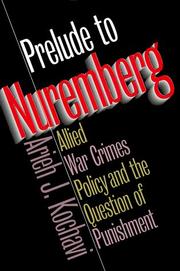| Listing 1 - 4 of 4 |
Sort by
|
Book
ISBN: 9781009106719 9781009098984 9781009107167 Year: 2022 Publisher: Cambridge Cambridge University Press
Abstract | Keywords | Export | Availability | Bookmark
 Loading...
Loading...Choose an application
- Reference Manager
- EndNote
- RefWorks (Direct export to RefWorks)
In the midst of the Second World War, the Allies acknowledged Germany's ongoing programme of extermination. In the Shadow of the Holocaust examines the struggle to attain post-war justice and prosecution. Focusing on Poland's engagement with the United Nations War Crimes Commission, it analyses the different ways that the Polish Government in Exile (based in London from 1940) agitated for an Allied response to German atrocities. Michael Fleming shows that jurists associated with the Government in Exile made significant contributions to legal debates on war crimes and, along with others, paid attention to German crimes against Jews. By exploring the relationship between the UNWCC and the Polish War Crimes Office under the authority of the Polish Government in Exile and later, from the summer of 1945, the Polish Government in Warsaw, Fleming provides a new lens through which to examine the early stages of the Cold War.
World War, 1939-1945 --- Holocaust, Jewish (1939-1945) --- War crimes investigation. --- Governments in exile. --- Atrocities --- United Nations War Crimes Commission. --- Poland --- Politics and government

ISBN: 080782433X Year: 1998 Publisher: Chapel Hill, N.C. : University of North Carolina Press,
Abstract | Keywords | Export | Availability | Bookmark
 Loading...
Loading...Choose an application
- Reference Manager
- EndNote
- RefWorks (Direct export to RefWorks)
Law of armed conflicts. Humanitarian law --- World history --- anno 1940-1949 --- World War, 1939-1945 --- War crimes --- 2ème guerre mondiale --- Crimes de guerre --- Atrocities --- Atrocités --- United Nations War Crimes Commission --- History --- 2ème guerre mondiale --- Atrocités
Book
ISBN: 1009106716 1009116800 1009098985 1009116606 Year: 2022 Publisher: Cambridge : Cambridge University Press,
Abstract | Keywords | Export | Availability | Bookmark
 Loading...
Loading...Choose an application
- Reference Manager
- EndNote
- RefWorks (Direct export to RefWorks)
In the midst of the Second World War, the Allies acknowledged Germany's ongoing programme of extermination. In the Shadow of the Holocaust examines the struggle to attain post-war justice and prosecution. Focusing on Poland's engagement with the United Nations War Crimes Commission, it analyses the different ways that the Polish Government in Exile (based in London from 1940) agitated for an Allied response to German atrocities. Michael Fleming shows that jurists associated with the Government in Exile made significant contributions to legal debates on war crimes and, along with others, paid attention to German crimes against Jews. By exploring the relationship between the UNWCC and the Polish War Crimes Office under the authority of the Polish Government in Exile and later, from the summer of 1945, the Polish Government in Warsaw, Fleming provides a new lens through which to examine the early stages of the Cold War.
World War, 1939-1945 --- Holocaust, Jewish (1939-1945) --- War crimes investigation. --- Governments in exile. --- Atrocities --- United Nations War Crimes Commission. --- Poland --- Politics and government --- War crime investigation --- Criminal investigation --- Diplomatic history --- United Nations. --- Rengōkoku Sensō Hanzai Iinkai
Book
ISBN: 1626164339 9781626164338 9781626164314 Year: 2017 Publisher: Washington, District of Columbia : Georgetown University Press,
Abstract | Keywords | Export | Availability | Bookmark
 Loading...
Loading...Choose an application
- Reference Manager
- EndNote
- RefWorks (Direct export to RefWorks)
Human Rights after Hitler is a groundbreaking history about the forgotten work of the UN War Crimes Commission (UNWCC), which operated during and after World War II in response to Axis atrocities. He explains the commission's work, why its files were kept secret, and demonstrates how the lost precedents of the commission's indictments should introduce important new paradigms for prosecuting war crimes today. The UNWCC examined roughly 36,000 cases in Europe and Asia. Thousands of trials were carried out at the country-level, and hundreds of war criminals were convicted. This rewrites the history of human rights in the wake of World War II, which is too focused on the few trials at Nuremberg and Tokyo. Until a protracted lobbying effort by Plesch and colleagues, the UNWCC's files had been kept out of public view in the UN archives under pressure from the US government. The US initially wanted the files closed to smooth the way for post-war collaboration with Germany and Japan, and the few researchers who did gain permission to see the files were not permitted to even take notes until the files' recent release. Now revealed, the precedents set by these cases should have enormous practical utility for prosecuting war crimes today.
Holocaust, Jewish (1939-1945) --- World War, 1939-1945 --- War crime trials --- Trials (War crimes) --- Trials (Crimes against humanity) --- Trials (Genocide) --- Trials --- Historiography. --- Atrocities. --- History --- United Nations War Crimes Commission --- United Nations. --- Rengōkoku Sensō Hanzai Iinkai --- History. --- Criminology. Victimology --- History of Europe --- antisemitism --- anno 1930-1939 --- anno 1940-1949
| Listing 1 - 4 of 4 |
Sort by
|

 Search
Search Feedback
Feedback About UniCat
About UniCat  Help
Help News
News